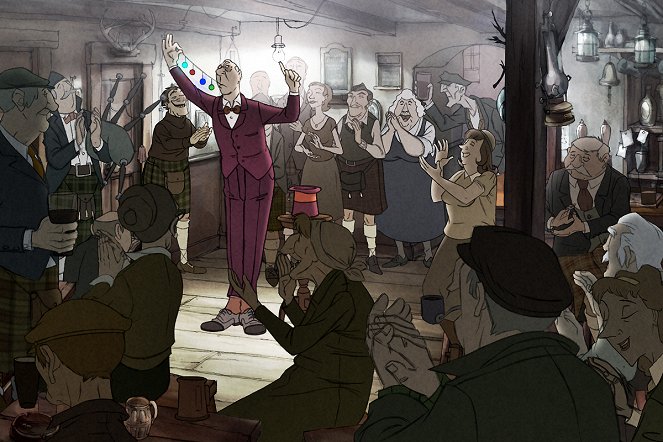Opisy(1)
Historia rozgrywa się w Edynburgu lat 50-tych XX wieku. Głównym bohaterem jest iluzjonista. Film przedstawia historię starzejącego się artysty music-hallowego, zmuszonego podróżować bez przerwy pomiędzy miastami i wsiami, aby prezentować wciąż swój numer magiczny w podrzędnych barach i parkach. Spotyka on pewnego dnia na swojej drodze młodą dziewczynę – Alice, która posiadając w sobie zachwyt dziecka, całkowicie wierzy w jego sztuczki uważając je za prawdziwą magię. Iluzjonista zaczyna się więc starać w swoich występach, aby ją uszczęśliwić. A ona obdarza go coraz większym zachwytem. Obserwujemy jej przebudzenie z miejscowego kopciuszka w pięknego łabędzia. Za słowami reżysera: „to nie jest romans, to bardziej relacja, jak pomiędzy ojcem a córką”. (Hagi)
(więcej)Materiały wideo (8)
Recenzje (3)
Beautifully mournful, but it's not Chomet. I understand that it is (and logically had to be) in Tati's spirit, but that is no reason to completely abandon that much poetic "Chomet-like" surrealistic bizarreness that makes a genius a genius.
()
Tati’s non-aggressive style of comedy, when Mr. Hulot often disappears somewhere in the mis-en-scéne, has been elevated to the level of the main theme in The Illusionist. The protagonist stands at the edge of the picture and edge of interest. If he doesn’t find a kindred spirit in a dreaming girl, no one will notice him; he is almost invisible. As with Hulot’s magic, with Tati everything is always hidden somewhere around the corner while also being omnipresent. The comedy arises from seemingly (given that this is an animated film, really seemingly) random situations – the wind blows open a wind and it starts raining. The gags do not show off their sophistication, but simply just happen. Chomet opens before us several doors at once and doesn’t warn us in advance that someone is coming through them. Just as Tati creates a particular situation and leaves it to develop and reverberate. He doesn’t rush, though the average shot length is obviously (even without using a stopwatch) shorter than in any of Tati’s three masterpieces. He references not only those (for example, the contents of the washed car’s trunk remind us of Mr. Hulot’s Holiday), but also the wrongfully ignored Traffic (the deluge of black umbrellas) and the circus-themed made-for-TV movie Parade. The reference that shines through most in the film, however, is My Uncle, whose plot The Illusionist paraphrases. There is more definitiveness this time only in Hulot’s final passing of the baton. His yielding of space to the youth inside him is marked with both bitterness and hope. The illusionist leaves, but the illusions – at least the cinematic ones – remain. Chomet doesn’t change Tati in his own likeness. He retains the characteristics of Mr. Hulot as an old-fashioned element that is sometimes disruptive in the modern world and who understands children but not technology, but he allows him to look at himself from the outside (literally in the scene from the cinema). I consider the most eloquent aspect of this virtually silent tribute to the last of the masters of slapstick to be the parallel micro-story of a sullen, world-weary clown who is more fascinated by the movement of machines than by the movement of living beings. Alone, neither human nor inhuman, not fitting in anywhere. I believe that Tati felt something similar. 85%
()
At first glance, Chomet seems to have calmed down compared to his most famous film (yes, I mean The Triplets of Belleville), giving up on his lively caricature-like drawings. He tames his creative flight to adapt a foreign substance and film a melancholic story of an aging entertainer who does not fit into the new rushed era, and dedicates his remaining energy to a poor girl, opening up to her the world of the big city from which he escaped to the countryside. The cabaret magician with a rabbit, essential props, and a supply of proven unchanging tricks is forcefully pushed off the stage by loud rock and roll and new techniques that offer greater miracles than the worn-out master. He has no home, and no future, and the present looks increasingly hopeless. Only nostalgia and memories of better times remain. The slow pace in this case does not matter because it corresponds to the chosen film aesthetics and subject. Overall impression: 80%.
()
Galeria (38)
Photo © Pathé Distribution



Reklama